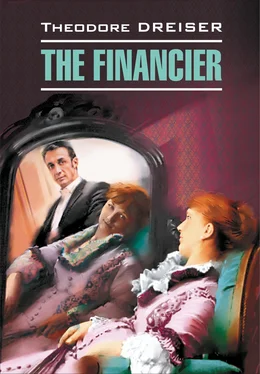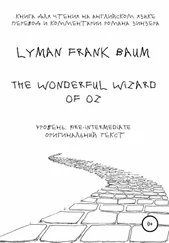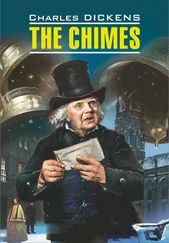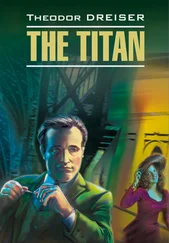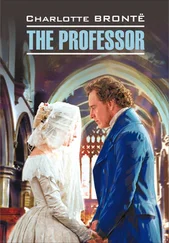He tried, because he loved her, to interest her in these things intelligently, but while she pretended slightly, she could not really see or care, and it was very plain that she could not.
The children took up a great deal of her time. However, Cowperwood was not troubled about this. It struck him as delightful and exceedingly worth while that she should be so devoted. At the same time, her lethargic manner, vague smile and her sometimes seeming indifference, which sprang largely from a sense of absolute security, attracted him also. She was so different from him! She took her second marriage quite as she had taken her first – a solemn fact which contained no possibility of mental alteration. As for himself, however, he was bustling about in a world which, financially at least, seemed all alteration – there were so many sudden and almost unheard-of changes. He began to look at her at times, with a speculative eye – not very critically, for he liked her – but with an attempt to weigh her personality. He had known her five years and more now. What did he know about her? The vigor of youth – those first years – had made up for so many things, but now that he had her safely…
There came in this period the slow approach, and finally the declaration, of war between the North and the South, attended with so much excitement that almost all current minds were notably colored by it. It was terrific. Then came meetings, public and stirring, and riots; the incident of John Brown’s [59] John Brown – Джон Браун (1800–1859), борец за освобождение чернокожих рабов в США; в 1859 г. поднял восстание в Виргинии; потерпел поражение, был взят в плен и казнен
body; the arrival of Lincoln [60] Lincoln – Авраам Линкольн (1809–1865), 16 президент США (с 1861 по 1965 г.)
, the great commoner, on his way from Springfield, Illinois, to Washington via Philadelphia, to take the oath of office [61] to take the oath of office – принести присягу
; the battle of Bull Run; the battle of Vicksburg; the battle of Gettysburg, and so on. Cowperwood was only twenty-five at the time, a cool, determined youth, who thought the slave agitation might be well founded in human rights – no doubt was – but exceedingly dangerous to trade. He hoped the North would win; but it might go hard with him personally and other financiers. He did not care to fight. That seemed silly for the individual man to do. Others might – there were many poor, thin-minded, half-baked creatures who would put themselves up to be shot; but they were only fit to be commanded or shot down. As for him, his life was sacred to himself and his family and his personal interests. He recalled seeing, one day, in one of the quiet side streets, as the working-men were coming home from their work, a small enlisting squad of soldiers in blue marching enthusiastically along, the Union flag flying, the drummers drumming, the fifes blowing, the idea being, of course, to so impress the hitherto indifferent or wavering citizen, to exalt him to such a pitch, that he would lose his sense of proportion, of self-interest, and, forgetting all – wife, parents, home, and children – and seeing only the great need of the country, fall in behind and enlist. He saw one workingman swinging his pail, and evidently not contemplating any such denouement to his day’s work, pause, listen as the squad approached, hesitate as it drew close, and as it passed, with a peculiar look of uncertainty or wonder in his eyes, fall in behind and march solemnly away to the enlisting quarters. What was it that had caught this man, Frank asked himself. How was he overcome so easily? He had not intended to go. His face was streaked with the grease and dirt of his work – he looked like a foundry man or machinist, say twenty-five years of age. Frank watched the little squad disappear at the end of the street round the corner under the trees.
This current war-spirit was strange. The people seemed to him to want to hear nothing but the sound of the drum and fife, to see nothing but troops, of which there were thousands now passing through on their way to the front, carrying cold steel in the shape of guns at their shoulders, to hear of war and the rumors of war. It was a thrilling sentiment, no doubt, great but unprofitable. It meant self-sacrifice, and he could not see that. If he went he might be shot, and what would his noble emotion amount to then? He would rather make money, regulate current political, social and financial affairs. The poor fool who fell in behind the enlisting squad – no, not fool, he would not call him that – the poor overwrought workingman – well, Heaven pity him! Heaven pity all of them! They really did not know what they were doing.
One day he saw Lincoln – a tall, shambling man, long, bony, gawky, but tremendously impressive. It was a raw, slushy morning of a late February day, and the great war President was just through with his solemn pronunciamento [62] pronunciamento – декларация, воззвание
in regard to the bonds that might have been strained but must not be broken. As he issued from the doorway of Independence Hall [63] Independence Hall – Дворец Независимости, здание в Филадельфии, где 4 июля 1776 г. была провозглашена независимость Соединенных Штатов Америки
, that famous birthplace of liberty, his face was set in a sad, meditative calm. Cowperwood looked at him fixedly as he issued from the doorway surrounded by chiefs of staff, local dignitaries, detectives, and the curious, sympathetic faces of the public. As he studied the strangely rough-hewn countenance a sense of the great worth and dignity of the man came over him.
“A real man, that,” he thought; “a wonderful temperament.” His every gesture came upon him with great force. He watched him enter his carriage, thinking “So that is the railsplitter [64] railsplitter – прозвище Линкольна, оставшееся со времен, когда он выступал в качестве адвоката по делам, связанным с железной дорогой
, the country lawyer. Well, fate has picked a great man for this crisis.”
For days the face of Lincoln haunted him, and very often during the war his mind reverted to that singular figure. It seemed to him unquestionable that fortuitously he had been permitted to look upon one of the world’s really great men. War and statesmanship were not for him; but he knew how important those things were – at times.
It was while the war was on, and after it was perfectly plain that it was not to be of a few days’ duration, that Cowperwood’s first great financial opportunity came to him. There was a strong demand for money at the time on the part of the nation, the State, and the city. In July, 1861, Congress had authorized a loan of fifty million dollars, to be secured by twenty-year bonds with interest not to exceed seven per cent., and the State authorized a loan of three millions on much the same security, the first being handled by financiers of Boston, New York, and Philadelphia, the second by Philadelphia financiers alone. Cowperwood had no hand in this. [65] Cowperwood had no hand in this . – Каупервуд не принимал в этом участия.
He was not big enough. He read in the papers of gatherings of men whom he knew personally or by reputation, “to consider the best way to aid the nation or the State”; but he was not included. And yet his soul yearned to be of them. He noticed how often a rich man’s word sufficed – no money, no certificates, no collateral, no anything – just his word. If Drexel & Co., or Jay Cooke & Co., or Gould & Fiske were rumored to be behind anything, how secure it was! Jay Cooke, a young man in Philadelphia, had made a great strike taking this State loan in company with Drexel & Co., and selling it at par. The general opinion was that it ought to be and could only be sold at ninety. Cooke did not believe this. He believed that State pride and State patriotism would warrant offering the loan to small banks and private citizens, and that they would subscribe it fully and more. Events justified Cooke magnificently, and his public reputation was assured. Cowperwood wished he could make some such strike; but he was too practical to worry over anything save the facts and conditions that were before him.
Читать дальше
